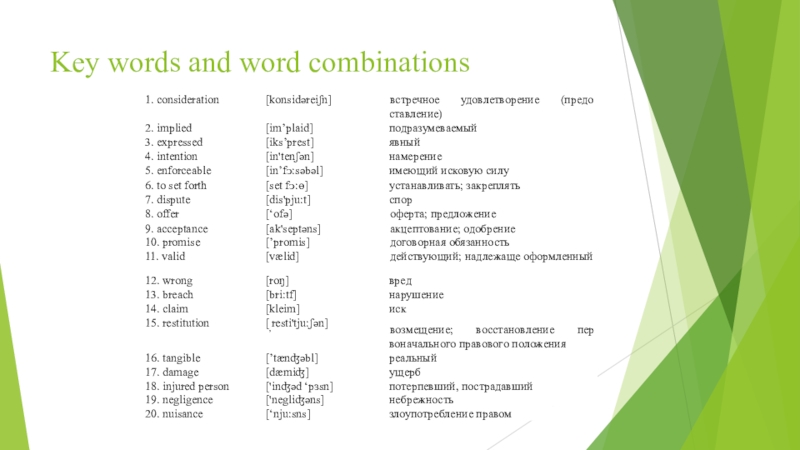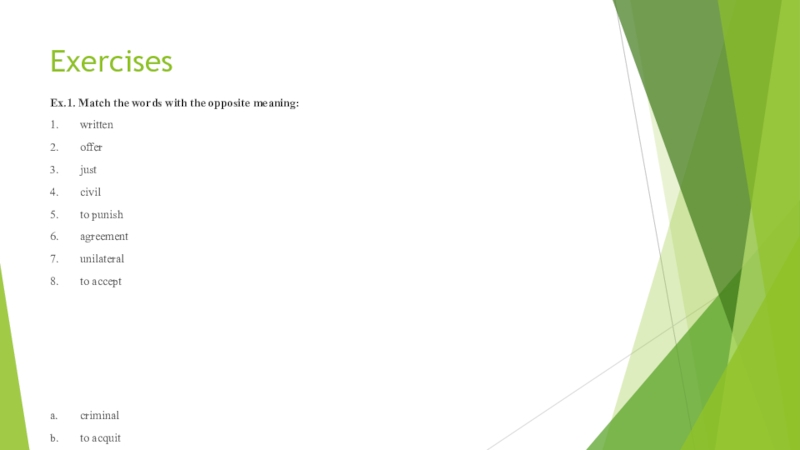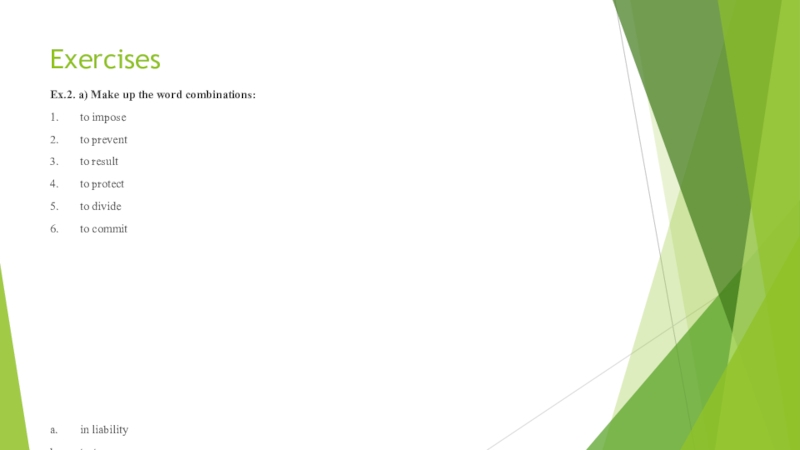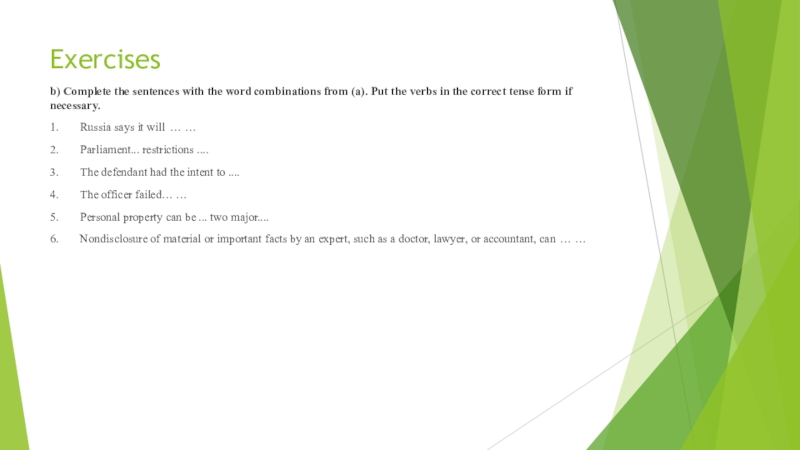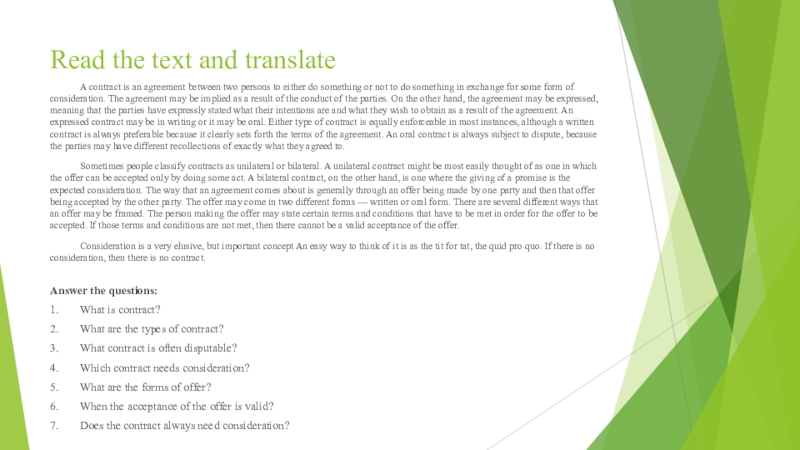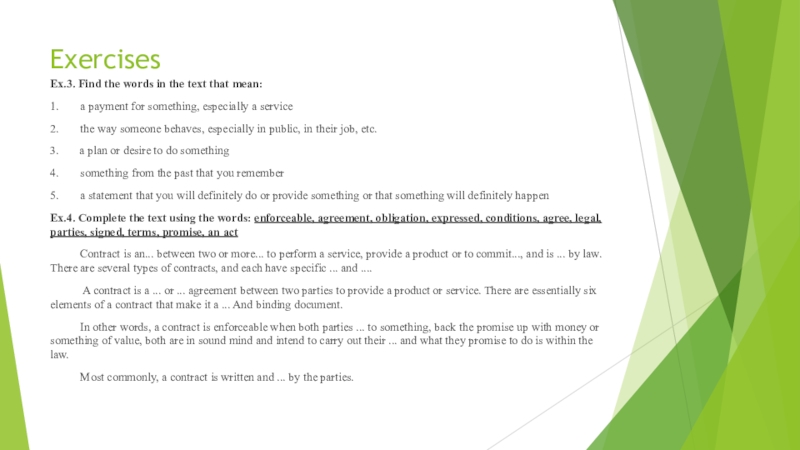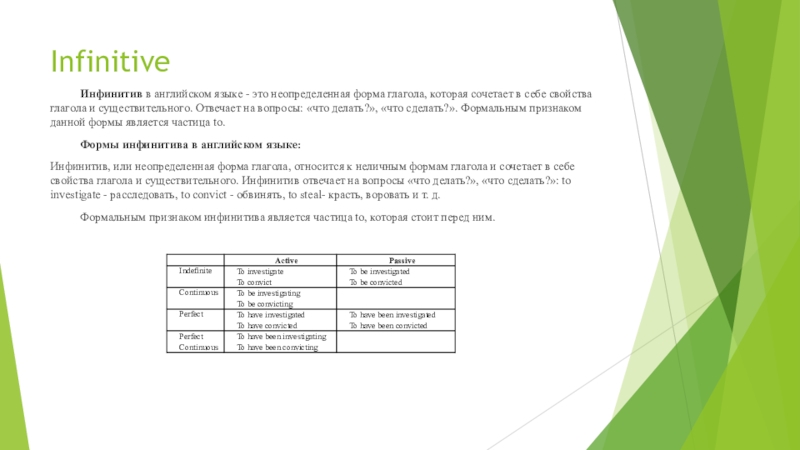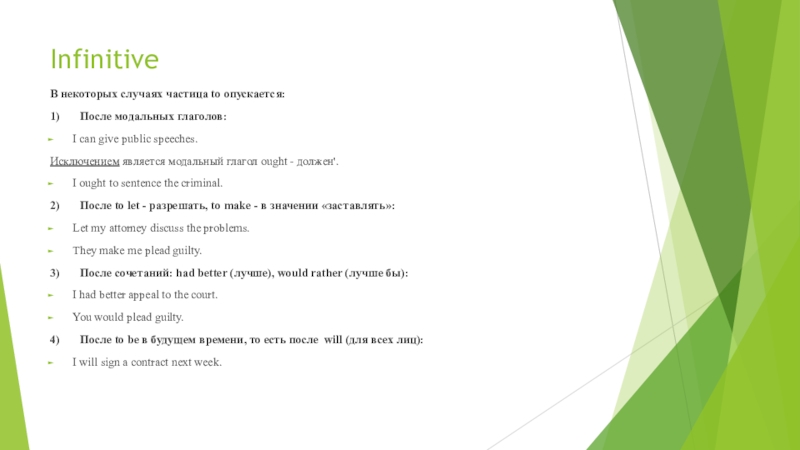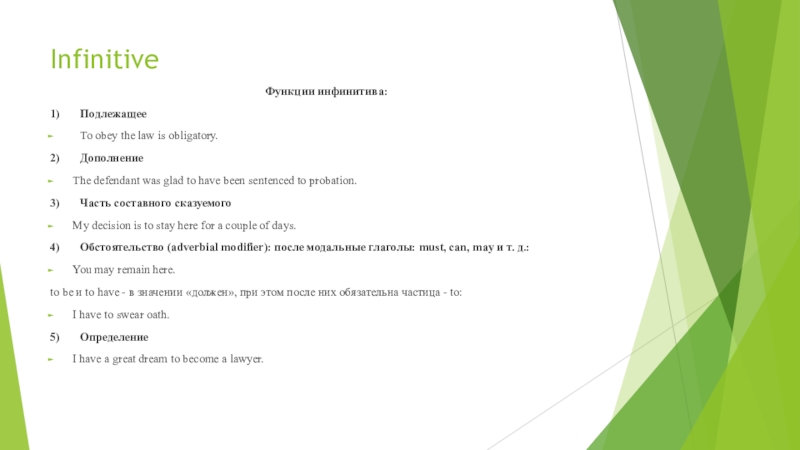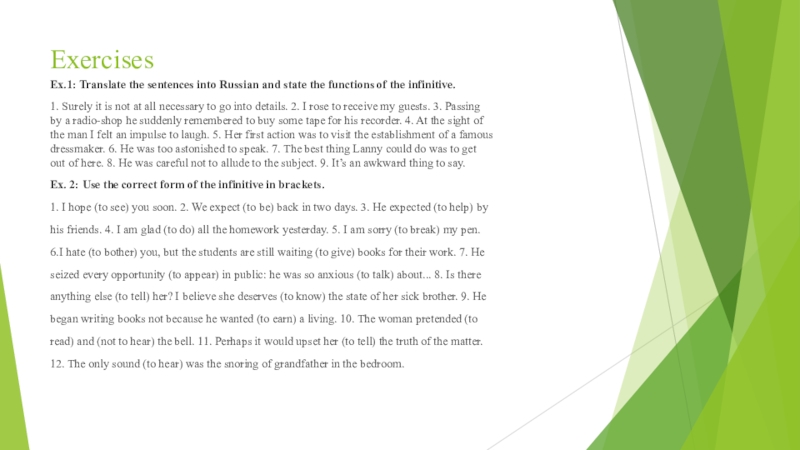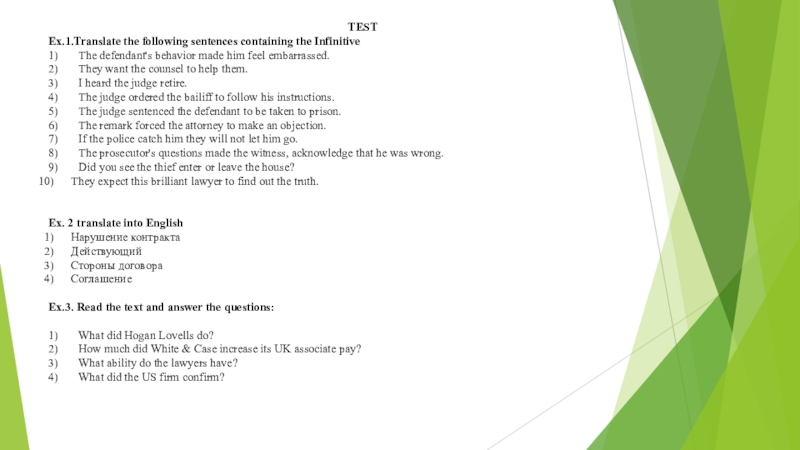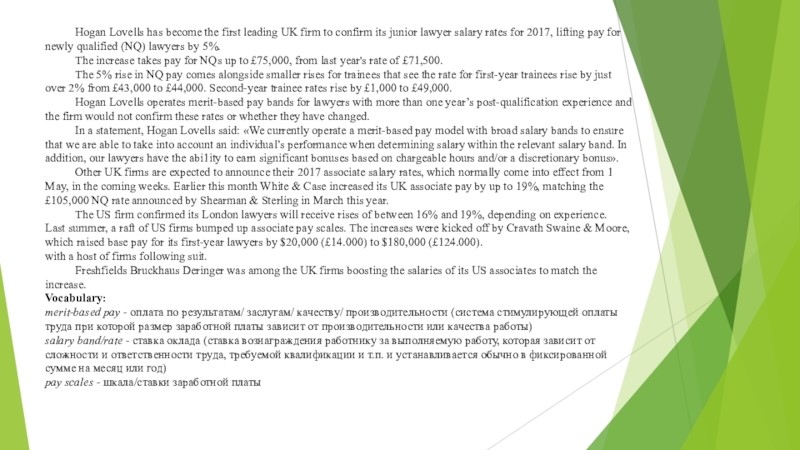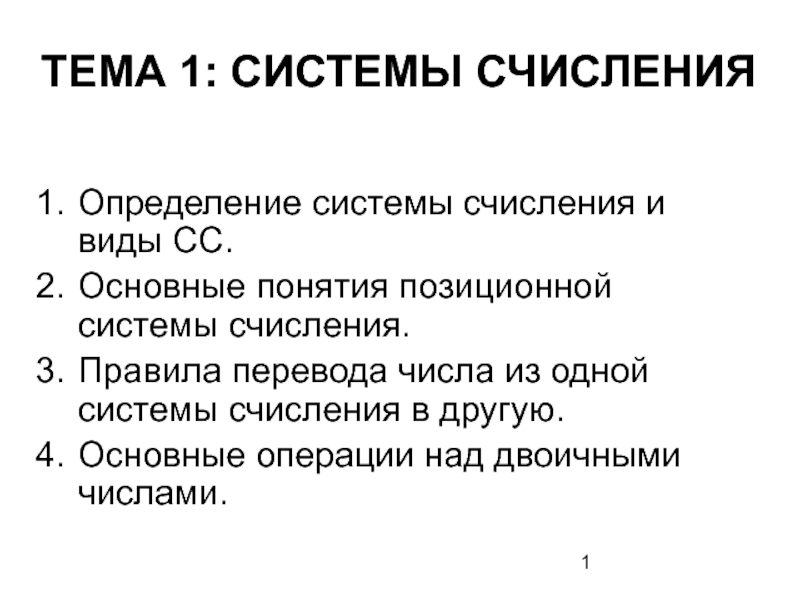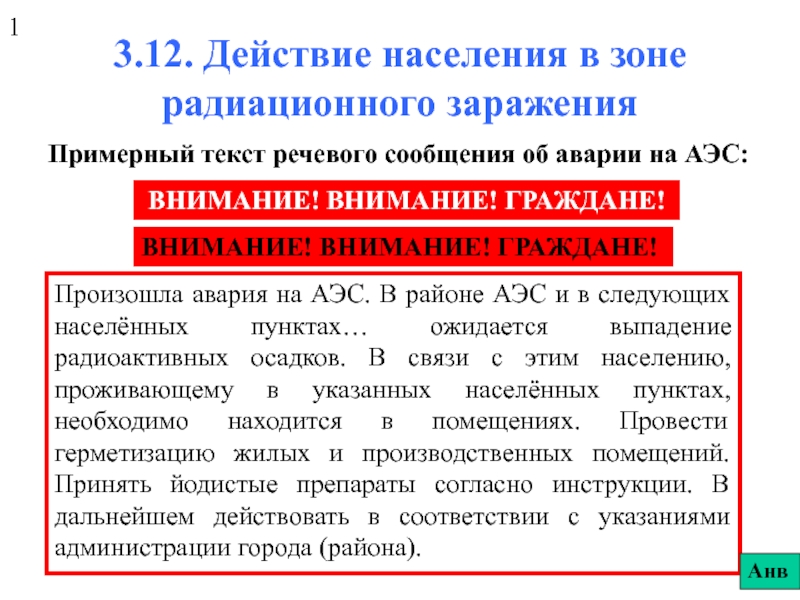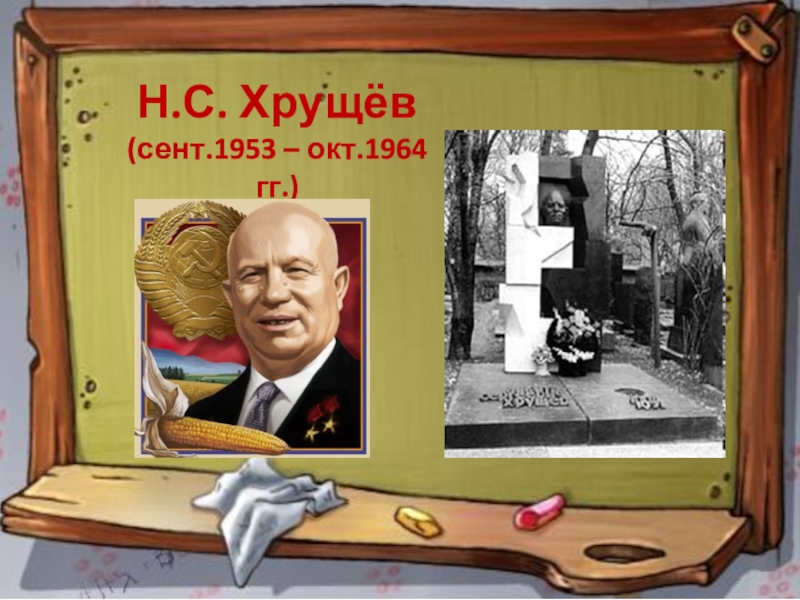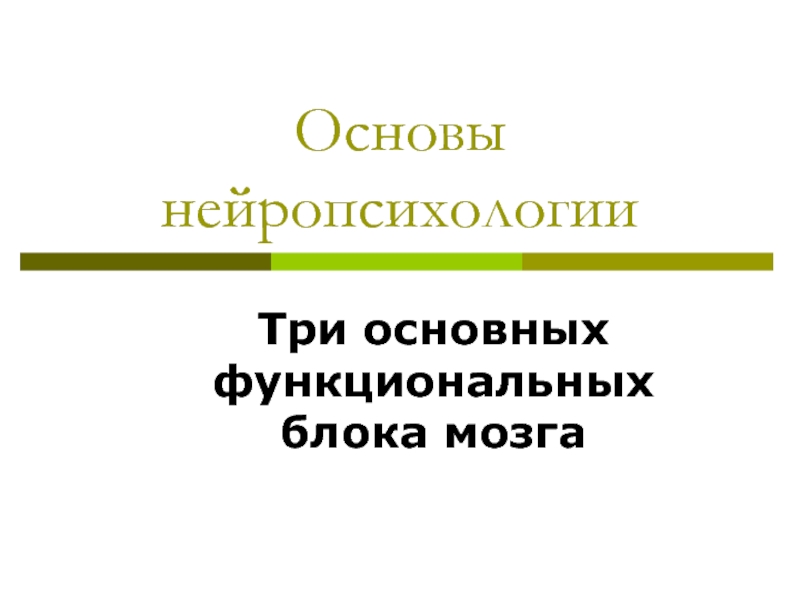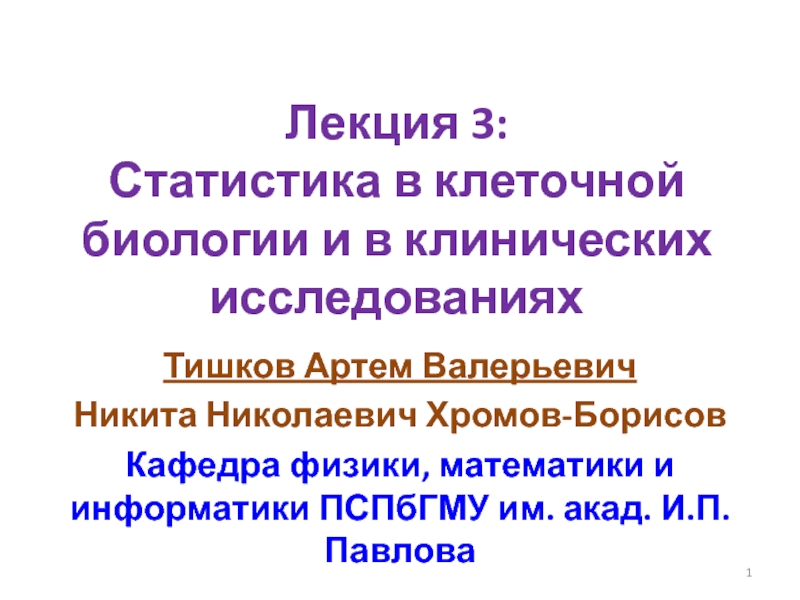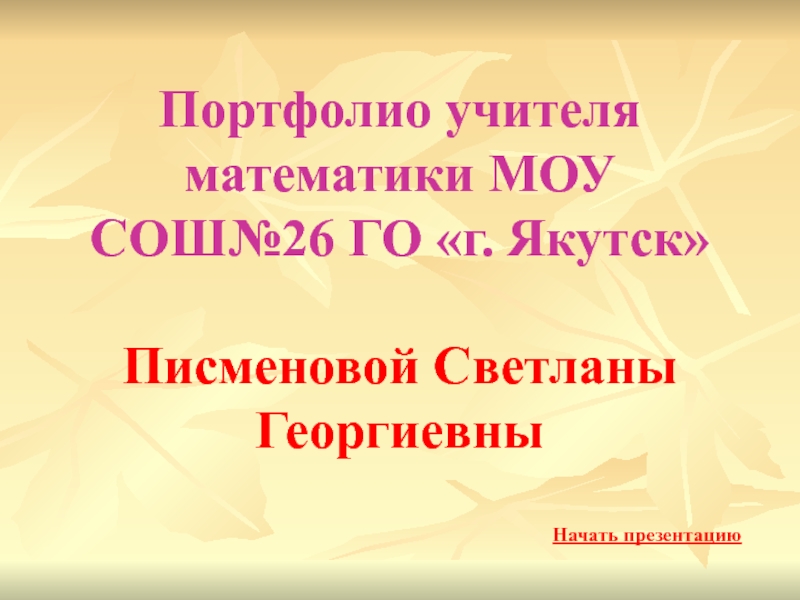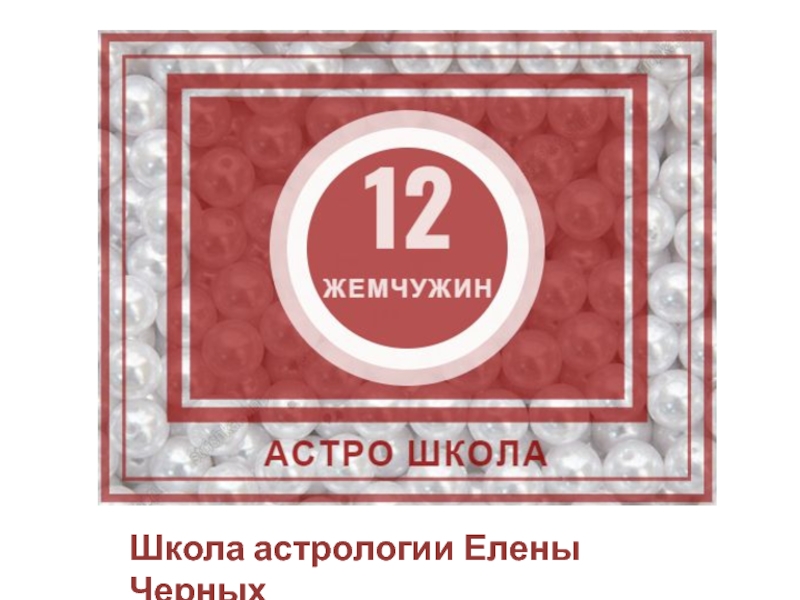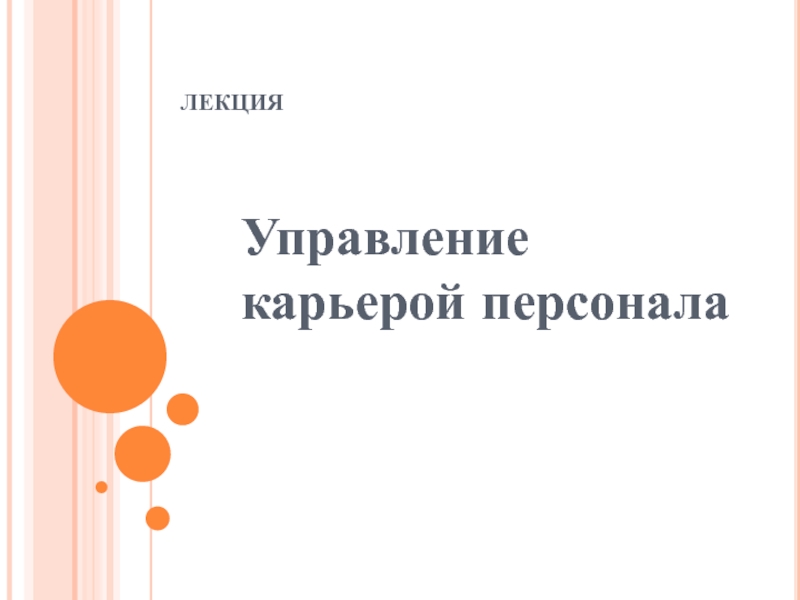Разделы презентаций
- Разное
- Английский язык
- Астрономия
- Алгебра
- Биология
- География
- Геометрия
- Детские презентации
- Информатика
- История
- Литература
- Математика
- Медицина
- Менеджмент
- Музыка
- МХК
- Немецкий язык
- ОБЖ
- Обществознание
- Окружающий мир
- Педагогика
- Русский язык
- Технология
- Физика
- Философия
- Химия
- Шаблоны, картинки для презентаций
- Экология
- Экономика
- Юриспруденция
The Law of Contract
Содержание
- 1. The Law of Contract
- 2. Key words and word combinations
- 3. ExercisesEx.1. Match the words with the opposite meaning:1. written2. offer3. just4. civil5. to punish6. agreement7. unilateral8. to accept a. criminalb. to acquitc. orald. disagreemente. multilateralf. acceptanceg. to rejecth. unjust
- 4. ExercisesEx.2. a) Make up the word combinations:1. to impose2. to prevent3. to result4. to protect5. to divide6. to commita. in liabilityb. tortc. into categoriesd. wrongse. interestsf. by law
- 5. Exercisesb) Complete the sentences with the word
- 6. Read the text and translate A contract is
- 7. ExercisesEx.3. Find the words in the text
- 8. Infinitive Инфинитив в английском языке - это неопределенная
- 9. InfinitiveВ некоторых случаях частица to опускается:1) После модальных
- 10. InfinitiveФункции инфинитива:1) Подлежащее То obey the law is obligatory.2) ДополнениеThe
- 11. ExercisesEx.1: Translate the sentences into Russian and
- 12. TESTEx.1.Translate the following sentences containing the Infinitive1) The
- 13. Hogan Lovells has become the first leading
- 14. THAHK YOU FOR ATTENTION
- 15. Скачать презентанцию
Key words and word combinations
Слайды и текст этой презентации
Слайд 3Exercises
Ex.1. Match the words with the opposite meaning:
1. written
2. offer
3. just
4. civil
5. to punish
6. agreement
7. unilateral
8. to accept
Слайд 4Exercises
Ex.2. a) Make up the word combinations:
1. to impose
2. to prevent
3. to result
4. to
protect
5. to divide
6. to commit
a. in liability
b. tort
c. into categories
d. wrongs
e. interests
f. by law
Слайд 5Exercises
b) Complete the sentences with the word combinations from (a).
Put the verbs in the correct tense form if necessary.
1. Russia
says it will … …2. Parliament... restrictions ....
3. The defendant had the intent to ....
4. The officer failed… …
5. Personal property can be ... two major....
6. Nondisclosure of material or important facts by an expert, such as a doctor, lawyer, or accountant, can … …
Слайд 6Read the text and translate
A contract is an agreement between
two persons to either do something or not to do
something in exchange for some form of consideration. The agreement may be implied as a result of the conduct of the parties. On the other hand, the agreement may be expressed, meaning that the parties have expressly stated what their intentions are and what they wish to obtain as a result of the agreement. An expressed contract may be in writing or it may be oral. Either type of contract is equally enforceable in most instances, although a written contract is always preferable because it clearly sets forth the terms of the agreement. An oral contract is always subject to dispute, because the parties may have different recollections of exactly what they agreed to.Sometimes people classify contracts as unilateral or bilateral. A unilateral contract might be most easily thought of as one in which the offer can be accepted only by doing some act. A bilateral contract, on the other hand, is one where the giving of a promise is the expected consideration. The way that an agreement comes about is generally through an offer being made by one party and then that offer being accepted by the other party. The offer may come in two different forms — written or oral form. There are several different ways that an offer may be framed. The person making the offer may state certain terms and conditions that have to be met in order for the offer to be accepted. If those terms and conditions are not met, then there cannot be a valid acceptance of the offer.
Consideration is a very elusive, but important concept An easy way to think of it is as the tit for tat, the quid pro quo. If there is no consideration, then there is no contract.
Answer the questions:
1. What is contract?
2. What are the types of contract?
3. What contract is often disputable?
4. Which contract needs consideration?
5. What are the forms of offer?
6. When the acceptance of the offer is valid?
7. Does the contract always need consideration?
Слайд 7Exercises
Ex.3. Find the words in the text that mean:
1. a payment
for something, especially a service
2. the way someone behaves, especially in
public, in their job, etc.3. a plan or desire to do something
4. something from the past that you remember
5. a statement that you will definitely do or provide something or that something will definitely happen
Ex.4. Complete the text using the words: enforceable, agreement, obligation, expressed, conditions, agree, legal, parties, signed, terms, promise, an act
Contract is an... between two or more... to perform a service, provide a product or to commit..., and is ... by law. There are several types of contracts, and each have specific ... and ....
A contract is a ... or ... agreement between two parties to provide a product or service. There are essentially six elements of a contract that make it a ... And binding document.
In other words, a contract is enforceable when both parties ... to something, back the promise up with money or something of value, both are in sound mind and intend to carry out their ... and what they promise to do is within the law.
Most commonly, a contract is written and ... by the parties.
Слайд 8Infinitive
Инфинитив в английском языке - это неопределенная форма глагола, которая
сочетает в себе свойства глагола и существительного. Отвечает на вопросы:
«что делать?», «что сделать?». Формальным признаком данной формы является частица to.Формы инфинитива в английском языке:
Инфинитив, или неопределенная форма глагола, относится к неличным формам глагола и сочетает в себе свойства глагола и существительного. Инфинитив отвечает на вопросы «что делать?», «что сделать?»: to investigate - расследовать, to convict - обвинять, to steal- красть, воровать и т. д.
Формальным признаком инфинитива является частица to, которая стоит перед ним.
Слайд 9Infinitive
В некоторых случаях частица to опускается:
1) После модальных глаголов:
I can give
public speeches.
Исключением является модальный глагол ought - должен'.
I ought to
sentence the criminal.2) После to let - разрешать, to make - в значении «заставлять»:
Let my attorney discuss the problems.
They make me plead guilty.
3) После сочетаний: had better (лучше), would rather (лучше бы):
I had better appeal to the court.
You would plead guilty.
4) После to be в будущем времени, то есть после will (для всех лиц):
I will sign a contract next week.
Слайд 10Infinitive
Функции инфинитива:
1) Подлежащее
То obey the law is obligatory.
2) Дополнение
The defendant was glad
to have been sentenced to probation.
3) Часть составного сказуемого
My decision
is to stay here for a couple of days.4) Обстоятельство (adverbial modifier): после модальные глаголы: must, can, may и т. д.:
You may remain here.
to be и to have - в значении «должен», при этом после них обязательна частица - to:
I have to swear oath.
5) Определение
I have a great dream to become a lawyer.
Слайд 11Exercises
Ex.1: Translate the sentences into Russian and state the functions
of the infinitive.
1. Surely it is not at all necessary
to go into details. 2. I rose to receive my guests. 3. Passing
by a radio-shop he suddenly remembered to buy some tape for his recorder. 4. At the sight of
the man I felt an impulse to laugh. 5. Her first action was to visit the establishment of a famous
dressmaker. 6. He was too astonished to speak. 7. The best thing Lanny could do was to get
out of here. 8. He was careful not to allude to the subject. 9. It’s an awkward thing to say.Ex. 2: Use the correct form of the infinitive in brackets.
1. I hope (to see) you soon. 2. We expect (to be) back in two days. 3. He expected (to help) by
his friends. 4. I am glad (to do) all the homework yesterday. 5. I am sorry (to break) my pen.
6.I hate (to bother) you, but the students are still waiting (to give) books for their work. 7. He
seized every opportunity (to appear) in public: he was so anxious (to talk) about... 8. Is there
anything else (to tell) her? I believe she deserves (to know) the state of her sick brother. 9. He
began writing books not because he wanted (to earn) a living. 10. The woman pretended (to
read) and (not to hear) the bell. 11. Perhaps it would upset her (to tell) the truth of the matter.
12. The only sound (to hear) was the snoring of grandfather in the bedroom.
Слайд 12TEST
Ex.1.Translate the following sentences containing the Infinitive
1) The defendant's behavior made
him feel embarrassed.
2) They want the counsel to help them.
3) I heard
the judge retire.4) The judge ordered the bailiff to follow his instructions.
5) The judge sentenced the defendant to be taken to prison.
6) The remark forced the attorney to make an objection.
7) If the police catch him they will not let him go.
8) The prosecutor's questions made the witness, acknowledge that he was wrong.
9) Did you see the thief enter or leave the house?
They expect this brilliant lawyer to find out the truth.
Ex. 2 translate into English
Нарушение контракта
Действующий
Стороны договора
Соглашение
Ex.3. Read the text and answer the questions:
1) What did Hogan Lovells do?
2) How much did White & Case increase its UK associate pay?
3) What ability do the lawyers have?
4) What did the US firm confirm?
Слайд 13 Hogan Lovells has become the first leading UK firm to
confirm its junior lawyer salary rates for 2017, lifting pay
for newly qualified (NQ) lawyers by 5%.The increase takes pay for NQs up to £75,000, from last year's rate of £71,500.
The 5% rise in NQ pay comes alongside smaller rises for trainees that see the rate for first-year trainees rise by just over 2% from £43,000 to £44,000. Second-year trainee rates rise by £1,000 to £49,000.
Hogan Lovells operates merit-based pay bands for lawyers with more than one year’s post-qualification experience and the firm would not confirm these rates or whether they have changed.
In a statement, Hogan Lovells said: «We currently operate a merit-based pay model with broad salary bands to ensure that we are able to take into account an individual’s performance when determining salary within the relevant salary band. In addition, our lawyers have the abi1ity to earn significant bonuses based on chargeable hours and/or a discretionary bonus».
Other UK firms are expected to announce their 2017 associate salary rates, which normally come into effect from 1 May, in the coming weeks. Earlier this month White & Case increased its UK associate pay by up to 19%, matching the £105,000 NQ rate announced by Shearman & Sterling in March this year.
The US firm confirmed its London lawyers will receive rises of between 16% and 19%, depending on experience.
Last summer, a raft of US firms bumped up associate pay scales. The increases were kicked off by Cravath Swaine & Moore, which raised base pay for its first-year lawyers by $20,000 (£14.000) to $180,000 (£124.000).
with a host of firms following suit.
Freshfields Bruckhaus Deringer was among the UK firms boosting the salaries of its US associates to match the increase.
Vocabulary:
merit-based pay - оплата по результатам/ заслугам/ качеству/ производительности (система стимулирующей оплаты труда при которой размер заработной платы зависит от производительности или качества работы)
salary band/rate - ставка оклада (ставка вознаграждения работнику за выполняемую работу, которая зависит от сложности и ответственности труда, требуемой квалификации и т.п. и устанавливается обычно в фиксированной сумме на месяц или год)
pay scales - шкала/ставки заработной платы

